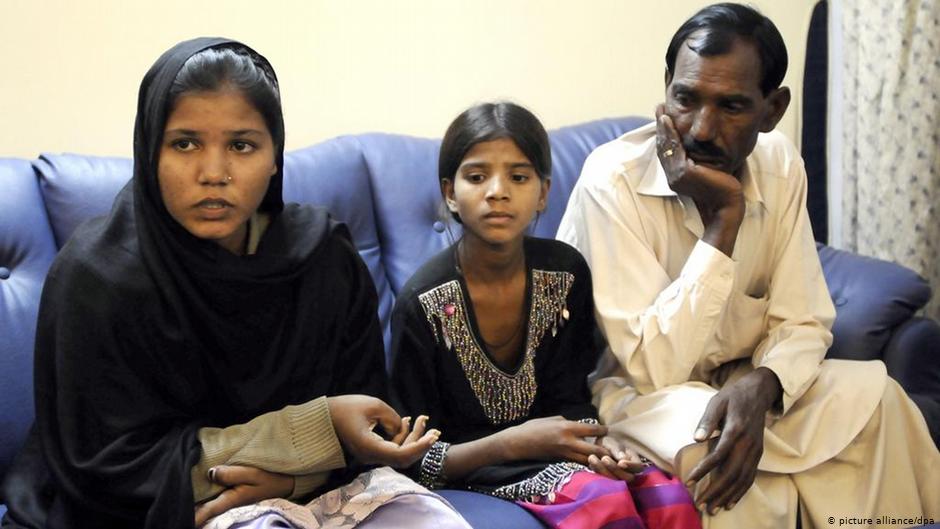According to reports by various human rights groups, approximately 1600 blasphemy cases have been filed in Pakistan since 1987, mostly against religious minority groups such as Christians, Ahmadiyas, Hindus and Shi’ite Muslims.
Currently there are hundreds of cases that are still awaiting a fair trial or have taken a long time to get justice. Cases of Asia Bibi and Junaid Hafeez exemplify this. Hafeez was a former lecturer in the English literature department at Bahahuddin Zakariya University, Multan, who was accused of blasphemy that he did not commit. Similarly the recent case of Wajih-ul-Hassan merits attention as after serving 18 years of imprisonment he was finally acquitted in September 2019 following untrue accusations that he allegedly wrote a Blasphemous letter.
“The overturned conviction of a man imprisoned for 18 years highlights just one of the many miscarriages of justice stemming from Pakistan’s vaguely worded blasphemy law,” said Brad Adams, a senior official working with Human Rights Watch. “Typically, it is members of religious minorities or other vulnerable communities who are wrongly accused and left unable to defend themselves”, he stated. Blasphemy, which is defined as “the act of insulting or showing contempt or lack of reverence for God”, has always been distorted/misused by extremist groups and vested interests Pakistan. Against this background, the recently concluded Brussels Press Club Conference held in July 2021 under the auspices of the ‘Alliance Internationale Pour la Defense des Droits et des Libertes’ discussed Pakistan’s controversial blasphemy laws. A former Member of European Parliament stated that many people were frequently framed without any foundation. Moreover often the lawyers fighting these cases face attack from fanatics. He also stressed on the need for the EU to do more to highlight this issue which has increasingly worsened the lives of minorities in Pakistan in the recent past.
Willy Fautre, Director, Human Rights Without Frontiers (HRWF) also highlighted the case of a Christian couple imprisoned in 2013 on blasphemy charges before being declared innocent by the Supreme Court of Pakistan. They are still struggling to live with dignity and are looking for political asylum outside of Pakistan. On April 29, 2021, the European Parliament had raised concerns regarding these blasphemy laws and adopted a resolution demanding space for religious freedom.
Last year, in December 2020 even the US House of Representatives had passed a resolution calling for repeal of blasphemy, heresy and apostasy laws across the world, which had resulted in the imprisonment and/or death of numerous people across the world.
The United States Commission on International Religious Freedom (USCIRF) 2019 report highlighted that in Pakistan, various political parties and leading politicians promoted intolerance against religious minorities during their lead-up to the 2018 national elections. The report further elaborated that Pakistan was yet to adequately protect minority groups despite the optimism generated for reforms by the government of Prime Minister Imran Khan. The USCIRF report envisaged that the entry of extremist parties into the electoral politics, (Hafiz Saeed’s Milli Muslim League) during the election period would lead to increased threats and hate speeches against religious minorities. This is no more evident than in the recent elections held in Pakistan administered Azad Kashmir where a former Tehreek e Taliban Pakistan (TTP) associate Mazhar Saeed Shah was given a reserve seat at the behest of PTI.
The report quoted that it is aware of at least 40 individuals currently sentenced to death or serving life sentences for blasphemy in Pakistan. Based on several severe violations, USCIRF designated Pakistan as a “country of particular concern” under the International Religious Freedom Act (IRFA) in 2019. Some provisions in these laws are deemed inconsistent with the universal Human Rights standards as they violate international standards of freedom of expression, freedom of religion and belief. In November 2019, the UN Human Rights Committee evaluated information provided by the Pakistani government on the follow-up of its observations regarding implementation of the International Covenant on Civil and Political Rights (ICCPR). Pakistan was yet to work on fulfilling its international legal obligations, and most of responses provided by the country were found to be insufficient.
The Committee also flagged the non-compliance of Pakistan in repealing blasphemy laws or in amending them in tandem with the rights-based principles and standards of the ICCPR. In fact, against this backdrop, the EU Parliament adopted a resolution to review Pakistan’s GSP+ Status in case it does not follow-up on fulfilling its international human rights obligations. While Pakistan has a considerable geostrategic role to play in the Asian region, the inability to deliver on restructuring blasphemy laws could strongly affect its international image.
Image Above – dw.com

